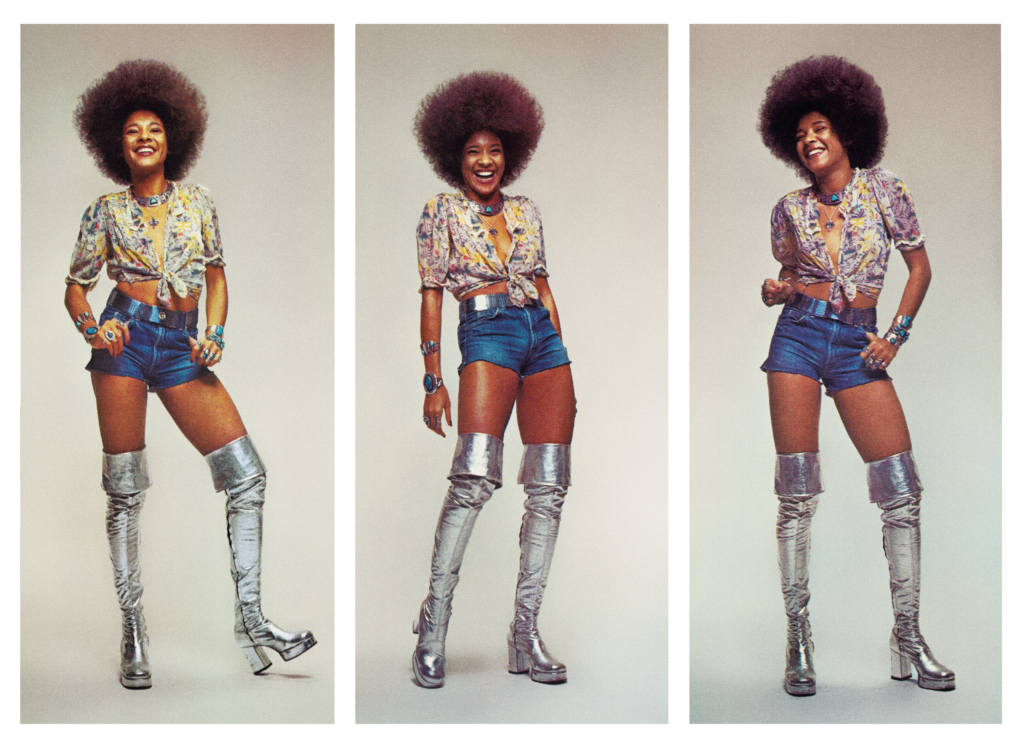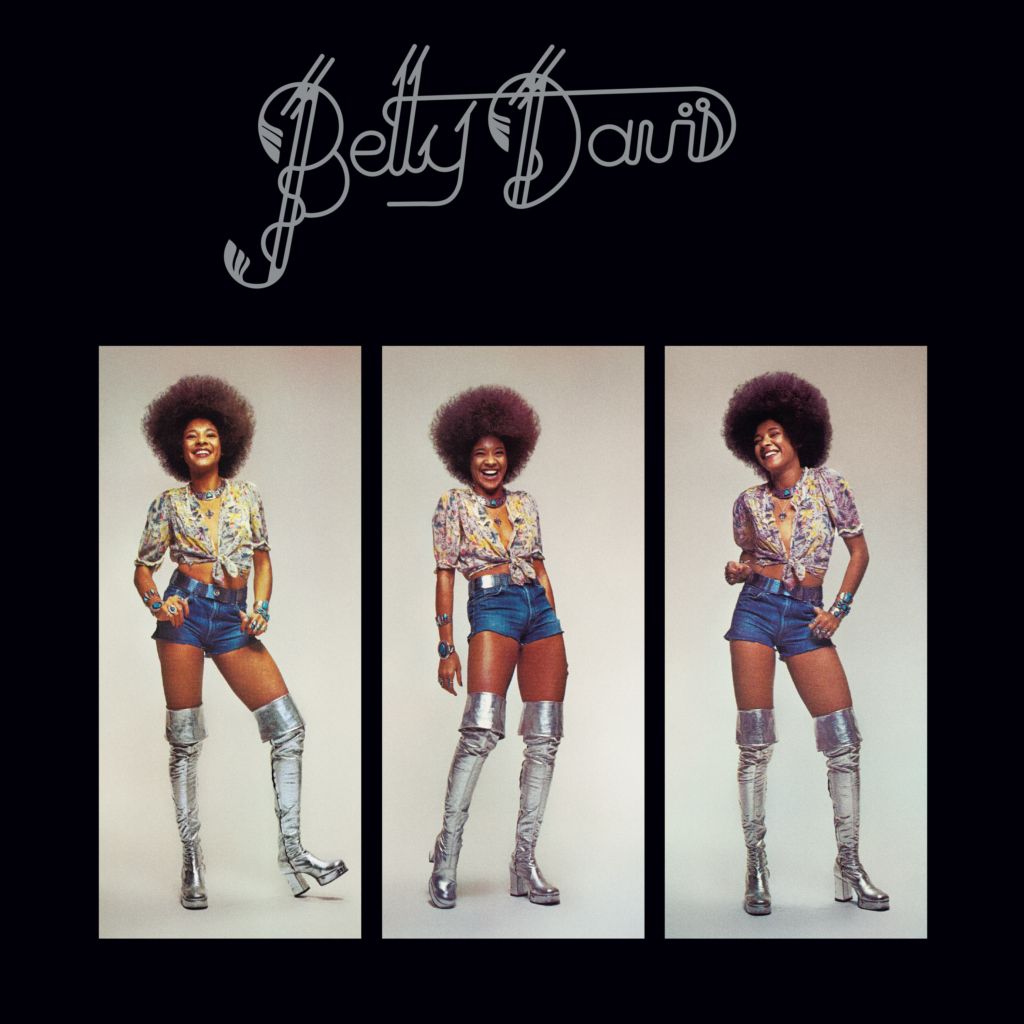Betty Davis
(Light In The Attic)
Contact Sam McAllister about Betty Davis
This year marks the 50th anniversary of Betty Davis’ self-titled debut — an electrifying artistic statement that launched one of modern music’s most revolutionary figures. To celebrate the visionary singer, songwriter, producer, and fashion icon’s broadly influential career, acclaimed reissue label Light in the Attic is revisiting four essential titles from The Queen of Funk’s catalog: Betty Davis (1973), They Say I’m Different (1974), Is It Love Or Desire? (recorded in 1976, released in 2009), as well as the first-ever vinyl release of Crashin’ From Passion, which captures Davis’ final 1979 sessions. All four tiles were produced in close collaboration with Davis, who sadly passed away in 2022.
Betty Davis, They Say I’m Different, and Crashin’ From Passion were remastered by Dave Cooley at Elysian Masters and pressed on vinyl at Record Technology, Inc. (RTI). For the aforementioned three titles, the accompanying booklets include a treasure trove of rare photos from the era, plus lyrics, and new liner notes by writer, ethnomusicologist, and Davis’ close friend, Danielle Maggio, who integrates interviews that she conducted with Davis, marking her last-ever interviews. They Say I’m Different also includes a fold-out 24×36 poster. Is It Love Or Desire? was remastered by GRAMMY®-nominated engineer John Baldwin and pressed on vinyl at Record Technology, Inc. (RTI). The album includes liner notes from journalist, DJ, and professor Oliver Wang.
Each album will be available on CD, black wax, and in a variety of exclusive color variants. All titles will be released on August 25th. Read below for more information on Davis and the individual albums.
Far ahead of her time, Queen of Funk Betty Davis (1944 – 2022) defied the limits of gender, race, and genre during her all-too-short career. She innovated with her space-age blend of funk, R&B, and blues and enraptured audiences with her raw and powerful vocals – then shocked (and awed) them with her provocative, sexually liberated lyrics. Unapologetic and independent, Davis smashed glass ceilings with gusto. To count a few, she was among the first Black models to grace the covers of Seventeen and Glamour, while later, she became the first Black woman to write, produce, and arrange her own albums.
When Davis released her self-titled debut in 1973, she was already a force in New York, London, and Los Angeles. She had opened one of NYC’s most vibrant private nightclubs, penned songs for The Chambers Brothers and The Commodores, collaborated with Hugh Masekela, and inspired her then-husband Miles Davis to create the roots for jazz fusion on Bitches Brew. While she received numerous offers from record labels in those early years, Davis also recognized the power of retaining control over her music. Fiercely DIY, she eventually signed a contract with Woodstock organizer Michael Lang’s Just Sunshine imprint, under which she released Betty Davis (1973) and They Say I’m Different (1974). In 1975, she made her major label debut under Island Records with Nasty Gal. Davis would go on to record two more albums—Is It Love Or Desire? and Crashin’ From Passion—both of which remained unreleased for decades.
Often relegated to cult figure status and frequently misunderstood, Davis’ album recording career spanned less than a decade. While her music earned critical acclaim and respect from peers, it was regularly banned or disregarded, due to its sexual nature. As a Black woman in an industry controlled by white men, Davis found herself in a constant battle for creative control, often to the detriment of her career. Never given the chance to succeed commercially, a disillusioned Davis retired from the spotlight in 1980.
From a modern lens, the path that Davis forged can be traced clearly throughout the decades, traversed by those who pushed the needle farther and fought for equality in the industry. Many of music’s brightest stars have counted Davis as an influence, including Prince, Erykah Badu, and Janelle Monae, while rappers like Ice Cube, Method Man, and Talib Kweli have all sampled her work. In recent years, Davis has captured a new generation of fans, thanks to the use of her songs in such series as Mixed-ish, Girlboss, Pistol, and Orange Is the New Black. In 2017, she was the subject of the acclaimed documentary, Betty: They Say I’m Different.
****
Betty Davis (LP, CD, Digital)
Released in 1973, Betty Davis’ self-titled debut served as a bold introduction to the artist, showcasing her futuristic funk, her provocative lyricism, and her utterly unique vocal abilities. Produced by Sly and the Family Stone drummer Greg Errico and recorded in the Bay Area, the album featured a who’s who of local talent, including guitarist Neal Schon (Santana, Journey), keyboardist Merl Saunders, bassist Larry Graham (Sly and the Family Stone), and horn players from Tower of Power. Backing Davis on vocals were the likes of The Pointer Sisters, future disco star Sylvester, and singer-songwriter Kathi McDonald.
“[Davis] screams, squeezes, and stretches her voice in ways that…had never [been] heard before,” writes Maggio, who calls the artist’s vocals “the most shockingly innovative aspect” of the album. Also ahead of its time was Davis’ songwriting, in which her sexuality was front and center. “If I’m In Luck, I Might Get Picked Up” was banned by radio stations for its references to sex work, while “Your Man My Man” extolls the virtues of non-monogamous relationships. Other highlights include the supremely groovy “Game Is My Middle Name,” as well as the empowering and refreshing “Anti-Love Song,” which flips romantic balladry on its head.
Pitchfork praised Betty Davis as “a groundbreaking slab of funk…fus[ing] soul, sex, and hard rock like the best Sly or Funkadelic disc, albeit from a female perspective. But if George Clinton waved his freak flag proudly, Betty Davis wore it as underwear then rubbed your face in it.”
***
They Say I’m Different (LP, CD, Digital)
Giving Ziggy Stardust a run for his money, Betty Davis is transformed into an Afrofuturist superhero on the cover of They Say I’m Different, her 1974 follow-up to Betty Davis. A hero she certainly was, as the album established Davis as the first Black woman to have sole credits as producer, writer, and arranger on her own LP. Recorded in the Bay Area, They Say I’m Different found the North Carolina-born artist exploring her blues roots and assembling nearly an entirely new collection of musicians, including guitarist Buddy Miles (Band of Gypsys), percussionist Pete Escovedo, drummer Mike Clark (Herbie Hancock), and Betty’s cousin, bassist Larry Johnson. Davis also enlisted a fresh line-up of backing vocalists (Trudy Perkins, Elaine Clark, and Debbie Burrell), whom she lovingly christened “The Ladies.”
While They Say I’m Different certainly has plenty of brash, tantalizing moments (“Shoo-B-Doop and Cop Him” and the S&M-themed “He Was a Big Freak,” among them), the album also finds Davis getting more personal with her writing. In the title track, the artist recalls her youth, her family, and such musical heroes as Lightnin’ Hopkins, Bessie Smith, and Muddy Waters. In the moody “70s Blues,” she employs a classic blues song structure, while revealing her vulnerable side, while she channels James Brown in the joyful “Git In There.” Another standout track is “Don’t Call Her No Tramp,” which, Maggio explains, “is directed towards Betty’s ‘haters.’ Instead of shaming women with derogatory labels like ‘tramp’ or ‘dirty,’ Betty argues for terms like ‘elegant hustler.’”
In 2007, The Guardian praised the album as “undoubtedly [Davis’] finest work,” declaring “They Say I’m Different was so far ahead of its time, it’s taken the world 33 years to get ready for it.”
***
Is It Love Or Desire? (LP, CD, Digital)
Following the release of They Say I’m Different, Davis assembled a touring band comprised of her cousins (drummer Nicky Neal and bassist Larry Johnson) and old friends from North Carolina (guitarist Carlos Morales and keyboardist Fred Mills). Funk House, as they were called, became a fixture in Davis’ life – not only joining her on the road for her thrilling live performances, but also becoming the studio band on her major label debut, Nasty Gal, which Island Records released in 1975. After touring concluded, the band spent a month at Bogalusa, Louisiana’s Studio in the Country to record their follow-up. Bringing in local talent, including the celebrated blues artist Clarence “Gatemouth” Brown, Davis recorded some of the most expressive songs of her career. As Neal recalls, it was “the best [album] she ever put together.”
Throughout the record, complex arrangements and inventive production techniques keep listeners on their toes, while Davis frequently takes a softer, more soulful approach to her vocals. Among the highlights is the stripped-down “When Romance Says Goodbye” (featuring the artist at a near whisper) and the bluesy “Let’s Get Personal,” in which Davis’ vocals are panned to one side, creating a sense of intimacy with her listeners. Other standout tracks include “Whorey Angel,” a duet between Davis and Mills, the danceable title track, and “Stars Starve, You Know,” an autobiographical number, in which Davis rips into her critics – delivering equal parts sass and vitriol.
Amid creative differences with the label, Davis’ masterpiece was shelved, where it remained unreleased for more than 30 years. First issued by LITA in 2009, the album drew broad praise. PopMatters hailed the LP as Davis’ “career high watermark,” while AllMusic called it “a revelation…Is It Love or Desire? is so forward and so complete, it moves the entire genre toward a new margin.”
***
Crashin’ From Passion (LP, CD)
In 1979, when Betty Davis entered an LA studio to record her fifth and final album, she was reeling from a series of setbacks. Three years earlier, after recording her fourth album, Is It Love Or Desire?, Davis was dropped from her label and the LP was subsequently shelved. In 1978, her beloved band Funk House went their separate ways. Looking for a fresh start, Davis relocated to Hollywood to focus on songwriting. Before long, British manager Simon Lait (Toni Basil), offered to fund her next project.
With renewed vigor, Davis reunited with former Funk House guitarist Carlos Morales and brought together industry veterans like fusion drummer Alphonse Mouzon and session bassist Chuck Rainey. Old friends Anita and Bonnie Pointer (The Pointer Sisters) and Patryce “Choc’let” Banks joined Davis on vocals, as did Motown legend Martha Reeves. The resulting album, Crashin’ From Passion, was her most musically diverse, blending elements of reggae and calypso (“I’ve Danced Before”), jazz (“Hangin’ Out in Hollywood,” “Tell Me a Few Things”), dark synth-pop (“She’s a Woman”), and even disco (“All I Do Is Think of You”). Equally exploratory are Davis’ vocals, as she trades in her signature sass and snarls for more nuanced stylings.
Among the album’s few funk tracks is “Quintessence of Hip,” in which Davis hails musicians like Bob Dylan, Billie Holiday, Stevie Wonder, and John Coltrane, while deftly integrating elements of their work. The song also offers a moment of stark vulnerability, as she sings, “Isn’t rich? Isn’t it queer? Losing my timing so late in my career.” It would prove to be a prophetic line in the months to follow.
The mixing process was mired by artistic differences and then cut short, amid the death of Davis’ beloved father. Bereft and exasperated, Davis returned home for the funeral, setting into motion her retirement from the music industry. Crashin’ From Passion, meanwhile, would be shelved for 15 years and licensed for a CD-only release, without Davis’ consent, in the ‘90s. This 2023 edition of the album, made with Davis’ full approval and cooperation, marks its first official release and first time ever on vinyl. The package was designed by GRAMMY®-winning artist, Masaki Koike, while the album cover features an incredible shot of Betty captured in London in the mid-1970s by renowned photographer Kate Simon.

